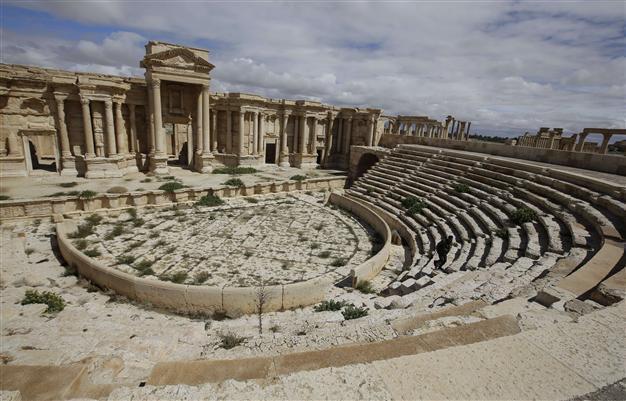Syrian official says situation in Palmyra 'under control'
DAMASCUS - The Associated Press

A file picture taken on March 14, 2014 shows a partial view of the theatre at the ancient oasis city of Palmyra, 215 kilometres northeast of Damascus. AFP Photo
A Syrian official said May 17 that the situation is "fully under control" in Palmyra despite breaches by Islamic State of Iraq and the Levant (ISIL) militants who pushed into the historic town a day earlier.Syrian opposition activists also confirmed that militants withdrew from a government building they had seized in the northern part of the town on May 16, as clashes between the two sides continued.
Palmyra is home to one of the most famous world heritage sites in the Middle East, renowned for its Roman-era colonnades and 2,000-year-old ruins. The militants entered from the north May 16 and have not reached the UNESCO world heritage site, which is southwest of Palmyra.
ISIL militants have destroyed and looted archaeological sites in Iraq and Syria. The group's advance on Palmyra has sparked alarm in the region and beyond. UNESCO chief Irina Bokova has said she is deeply concerned and called on all parties to spare Palmyra from the fighting.
Gov. Talal Barazi of Homs province said Syrian troops recaptured two hills from the militants late May 16. He told The Associated Press that army reinforcements have been sent to shore up existing troops.
"Palmyra is safe and the road linking Homs with Palmyra is absolutely safe," he later told the state-run news agency SANA. The agency said the army inflicted heavy losses on militants in the ISIL-held villages of Sukhneh and Arak northeast of Palmyra.
An opposition media collective for Palmyra said life inside the town was normal and stores and businesses were gradually reopening. Clashes were continuing in surrounding areas.
The fall of Palmyra to ISIL militants would be an enormous blow for Syrian President Bashar Assad, not only because of its cultural significance but also because it would open the road to Homs and the capital, Damascus.
















